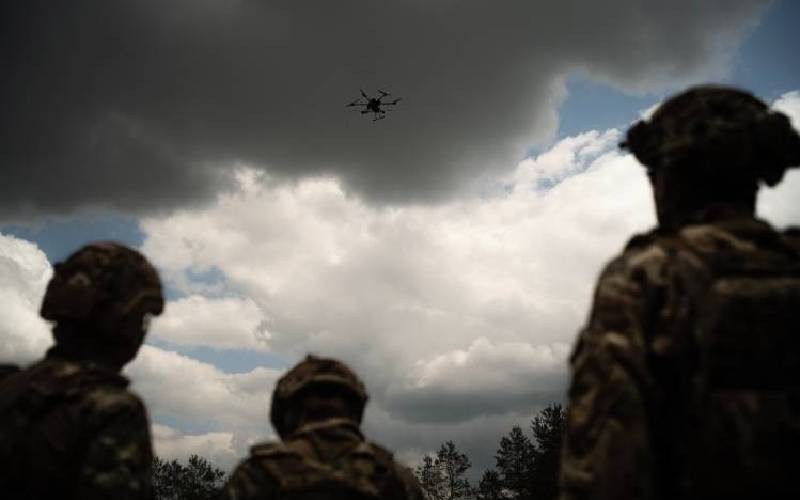Friday, July 4. Russia's War On Ukraine: News And Information From Ukraine

KYIV, UKRAINE - JULY 04: Senior citizens move away from the scene after Russian airstrike in Kyiv, ... More Ukraine on July 04, 2025. Photo by State Emergency Service of Ukraine/Anadolu via Getty Images
Anadolu via Getty ImagesAccording to reports from NBC News and The Wall Street Journal, the paused deliveries include dozens of Patriot missiles, thousands of 155mm artillery shells, more than 100 Hellfire missiles, more than 250 GMLRS precision-guided rockets, and other critical munitions. Some of these weapons are reportedly stuck at logistical hubs in Europe, including Patriot missiles stranded in Poland.
U.S. President Donald Trump’s administration has described the pause as pragmatic, not political. The decision was taken “to put America’s interests first” following a defense department review of U.S. military support to other countries, said White House Deputy Press Secretary Anna Kelly. U.S. Ambassador to NATO Matthew Whitaker offered a similar basis for the decision. “The most important thing to know is that this is what America first looks like. We first have to take care of the United States’ needs, and this is something that the Pentagon does all the time,” said Whitaker in an interview with Fox Business.
Ukraine’s defense ministry stated on July 2 that Ukraine had not received formal notice of the decision. Ukrainian President Volodymyr Zelenskyy claimed that Ukraine and the U.S. were working to clarify the details regarding delivery of defense assistance. In parallel, Ukraine’s Foreign Ministry summoned the U.S. Chargé d’Affaires in Ukraine, John Ginkel, and expressed deep concern over the suspension of military aid; the ministry further issued one of its strongest statements to date, warning that Washington's arms pause “only encourages the aggressor to continue terror.”
European officials have also expressed concern that without U.S. supplies, Ukraine’s military could face a critical shortage of air defense systems within months. NATO Secretary General Mark Rutte warned that Ukraine cannot sustain its defenses, even in the short term, without continued supplies of air defense systems and ammunition. Rutte acknowledged Washington’s concerns over its own stockpiles but called for more flexibility.
“The fewer arms Ukraine receives, the sooner the special military operation [war in Ukraine] will come to an end,” Kremlin spokesman Dmitry Peskov told reporters on July 2.
The conversation, which lasted nearly one hour, touched on the war in Ukraine, potential joint economic cooperation and developments in the Middle East, according to Kremlin aide Yuri Ushakov. Both leaders expressed willingness to continue political dialogue, although no specific plans were made for a personal meeting. Ushakov said the idea of such a meeting “remains in the air.”
The call is part of a series of official communications between the two leaders this year. Their last bilateral phone conversation took place on June 14. The first contact occurred on February 12, one day after the visit of U.S. special envoy Steve Witkoff to Moscow. According to the Financial Times, Trump is also scheduled to speak with President Zelenskyy on July 4, U.S. Independence Day, to discuss the suspension of U.S. arms supplies.
Overnight on July 4th, Russia launched a massive attack, involving some 500 missiles and drones, targeting Kyiv and other cities across Ukraine. The attacks on Kyiv wounded at least 19 people, with 14 victims hospitalized.
A Russian daytime drone strike on July 3 targeted the regional capital of Ukraine’s central Poltava region, killing two people and wounding 47 others. City authorities declared July 4 a day of mourning for the victims. Meanwhile, Russia’s attacks in eastern Donetsk province killed eight local residents and wounded at least 22 others on July 1-2. On July 3, Russian forces killed at least four people and wounded three more in the area. In the neighboring Dnipropetrovsk region, Russian strikes that day killed one civilian.
Major Mikhail Gudkov. One of Russia's most senior officers, Gudkov was deputy commander of the Russian navy, in charge of its marine units and coastal rocket forces. He received special praise from Russian President Vladimir Putin in March for his outstanding service. Gudkov previously commanded the 155th Marine Brigade, accused by Ukraine of committing war crimes, including the execution-style murder of Ukrainian prisoners.
EU Struggles to End Russian Energy Dependence
The European Union remains far from cutting off Russian energy, despite repeated promises following the Russian invasion of Ukraine. According to estimates, if the bloc were to secure alternative suppliers and end political gridlock on the issue, it might cut Moscow’s fossil fuel earnings by nearly $60 billion a year, or more than 20% of its total federal earnings.
But three years into political confrontation with Russia, Europe’s progress in gaining energy independence from the Kremlin is stuck in limbo. After 17 rounds of sanctions, Russian gas and liquefied natural gas continue to flow into Europe. Last year alone, EU countries spent about $25 billion on Russian fossil fuels, a decline of just 1% compared to 2023 and, more worryingly, exceeding the total financial aid provided to Kyiv by $3 billion.
The EU has a plan to end reliance on Russian energy by 2027. Its execution, however, is slow and hampered by internal political divisions. Some member states, such as Slovakia, chronically threaten to block further sanction packages, arguing that Russian energy keeps prices down. Uranium is another weak spot: five EU nations, including Finland, are still importing Russian uranium to fuel their nuclear plants. This dependency isn’t going away soon; Hungary is building two new nuclear reactors with Rosatom, Moscow’s leading state-owned nuclear company.
By Danylo Nosov, Alan Sacks







